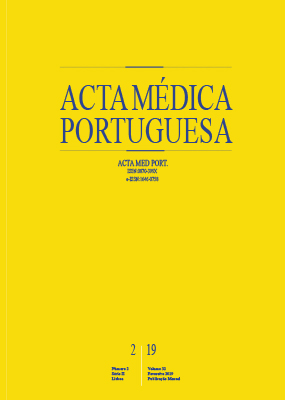Inappropriate Prescribing to Elderly Patients in an Internal Medicine Ward
DOI:
https://doi.org/10.20344/amp.10683Keywords:
Aged, Deprescriptions, Inappropriate Prescribing, Polypharmacy, PortugalAbstract
Introduction: Polypharmacy is often observed in elderly patients and is associated with an increased risk of adverse drug reactions, side effects and interactions. Clinicians should be alert to inappropriate drug prescribing and reduce polypharmacy.
Material and Methods: Observational, longitudinal, retrospective and descriptive study in an internal medicine ward in a Portuguese hospital. Polypharmacy was defined as the use of five or more different medicines. The purpose of this study was to describe the prevalence of polypharmacy and inappropriate prescribing at admission and discharge in an internal medicine ward, according to deprescribing.org guidelines/algorithms. A total of 838 consecutive patients were admitted between January and July 2017. All patients were aged under 65 years old, and those who died before discharge were excluded. Patients’ medications were reviewed from a medical database at hospital admission and discharge. We examined whether patients were taking anticoagulants, proton pump inhibitors, benzodiazepines, antipsychotics and/or antihyperglycemic medication.
Results: A total of 483 patients were included, mean age was 79.2 ± 8.0 years, and 42% of patients were male. Median number of medications at admission and discharge was six. Polypharmacy was present in more than 70% of admitted patients. Proton pump inhibitors were the most common inappropriate prescription at discharge (17.2%).
Discussion: This study demonstrated a low use of inappropriate medicine (11.2% - 17.2%) in older people discharged from hospital, when compared to other studies.
Conclusion: Our study shows that polypharmacy is present in more than 70% of elderly admitted patients. Nevertheless, the drug inappropriateness rate was not significantly affected by polypharmacy at both admission and discharge, being overall lower than published data.
Downloads
Downloads
Published
How to Cite
Issue
Section
License
All the articles published in the AMP are open access and comply with the requirements of funding agencies or academic institutions. The AMP is governed by the terms of the Creative Commons ‘Attribution – Non-Commercial Use - (CC-BY-NC)’ license, regarding the use by third parties.
It is the author’s responsibility to obtain approval for the reproduction of figures, tables, etc. from other publications.
Upon acceptance of an article for publication, the authors will be asked to complete the ICMJE “Copyright Liability and Copyright Sharing Statement “(http://www.actamedicaportuguesa.com/info/AMP-NormasPublicacao.pdf) and the “Declaration of Potential Conflicts of Interest” (http:// www.icmje.org/conflicts-of-interest). An e-mail will be sent to the corresponding author to acknowledge receipt of the manuscript.
After publication, the authors are authorised to make their articles available in repositories of their institutions of origin, as long as they always mention where they were published and according to the Creative Commons license.









